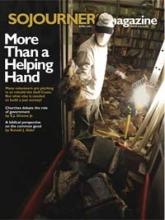Former President Jimmy Carter's new book, Palestine: Peace Not Apartheid, has provoked a storm of controversy since its publication last November. The book immediately soared and has remained high on all the nonfiction best-seller lists. Carter has appeared on numerous national television and radio talk shows to discuss the book and answer his often vitriolic critics. This highly visible drama is instructive and, potentially, a constructive contribution to the elusive search for peace in the Israeli-Palestinian conflict.
Carter's credentials as a global advocate and hands-on worker for human rights and free and democratic elections, as well as Middle East peacemaking, are well-known and widely affirmed—including by the Nobel Peace Prize committee in 2002. As the American president who, arguably, has done more internationally to promote peace and reconciliation than any other world leader, the venomous attacks in response to his book are all the more striking. What is going on? What can we learn from Carter's book, the heated debate, and the efforts of other influential evangelical Christians seeking to shape views and actions on the volatile Israeli-Palestinian conflict?
The most widespread criticism of Carter's book centers on his use of the term "apartheid." It is obviously provocative. Carter makes clear that he used the word advisedly and with the hope that it would stimulate much-needed discussion. Although he is careful to underscore how his use of the term is not intended to suggest racial discrimination or describe policies and practices within the pre-1967 borders of Israel, many critics either miss or simply ignore his point. He is describing the functional realities of land seizures and mini-Bantustans that he, virtually all Palestinians, and many Israelis recognize after 40 years of Israeli military occupation in the West Bank and, until 2005, Gaza.
Read the Full Article
